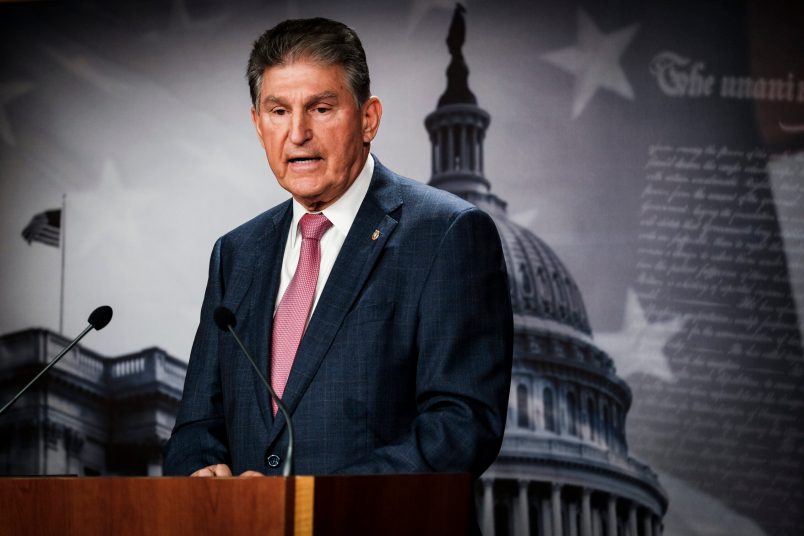A new report from the Bureau of Labor Statistics showing that prices rose in October and are hovering at a notably high point has triggered a full-on Democratic panic attack over the fate of the reconciliation bill.
While those two things may seem unrelated — spoiler alert: they are — one man binds them together: Sen. Joe Manchin (D-WV).
He tweeted Wednesday that the inflation spike is not temporary and is, instead, “getting worse,” prompting a bout of furious tea leaf reading. Democrats speculated in public and in private that the West Virginia senator will use the inflation levels as an excuse to slow down or kill the reconciliation package (also known as Build Back Better, or BBB). He has cited inflation fears before, when enumerating his objections to a bigger reconciliation package. Republicans are glomming on to the talking point, which they see as handy to both imperil the bill and boost their midterm chances.
While there are multiple valid theories about why this current inflation spike is surprisingly high and when it will subside, economists told TPM that there is overwhelming consensus that the reconciliation package will not cause inflation.
A Slow Injection
“That claim has zero merit,” Josh Bivens, research director at the left-leaning Economic Policy Institute, told TPM. “Whether or not BBB passes will not move the inflation rate up or down over the next year.”
Inflation is a measure of increasing prices of goods and services, often caused when a surge in demand means that customers are willing to pay those higher prices.
Bivens pointed to the fact that the package is not deficit spending, but entirely or almost entirely financed by taxes. It’s also, simply, not a stimulus package meant to inject a ton of money into the economy all at once.
“BBB is about public investment and safety net stitching,” he said. “It’s gonna come online at a much slower rate.”
It’s crafted differently, and has a different purpose, than the American Rescue Plan (ARP) President Joe Biden signed in March, which was front-loaded with money to throw people a financial lifeline. Some have argued that ARP contributed to the current inflationary spike by giving people more money to spend, increasing demand while supply remained low.
Many economists told TPM that they don’t buy this theory about ARP, or at least don’t buy that the law was enough to cause this inflation on its own. They point to other factors, including a drastic shift in consumer spending away from face-to-face services (gyms, concerts, doctor appointments) to durable goods (couches, pants, sourdough starter kits), overburdened and snarled up supply lines and an enduring pandemic that hasn’t let either of those things return to normal. Additionally, inflation rates are high worldwide, weakening the theory that one country’s fiscal policy is to blame, said Austan Goolsbee, economics professor at the University of Chicago Booth School of Business.
But regardless of ARP’s impact on inflation, the reconciliation bill functions differently. The components of the bill that do put money in Americans’ pockets pay out much more slowly, and at predictable times.
“One of the good things about government planning and investment is that people know what’s gonna happen and prepare,” Lauren Melodia, deputy director of macroeconomic analysis at the left-leaning Roosevelt Institute, told TPM. “The issues we have right now are because businesses did not anticipate the disruption they’d see this year.”
Some even argue that the bill could have a dampening effect on inflation across the 10 years it runs, since it contains proposals to make childcare more affordable, which would free up more people to join the workforce and expand the economy’s capacity, and invests in clean energy production, which would shift the country away from the wild volatility of fossil fuel prices.
“At the most conservative, there’s uncertainty about what the reconciliation bill will do; most people think it won’t contribute to inflation,” said Goolsbee.
Inflation As Boogeyman
Partisans flinging “but inflation!” at bills they don’t like is not exactly a new tactic.
“Inflation is always the boogeyman people try to throw against expansionary policy in general,” said EPI’s Josh Bivens. “It’s proving more effective this time because the inflation rate has actually increased, for nuanced reasons.”
Even though, as Roosevelet’s Melodia said, it’s “just part of our society — we will always have inflation,” it’s treacherous for politicians. No president wants to see higher prices for gas and groceries under his watch, especially when there’s not much he can do about it.
The Federal Reserve can bring down inflation by raising interest rates and sparking a recession — a “pretty dangerous” move for an economy that still hasn’t recovered from the pandemic, said John Horn, economics professor at the University of Washington St. Louis’ Olin Business School.
But if the cause for the current spike is indeed the combination of pandemic-changed spending habits and pandemic-hobbled supply chains, the key to dropping inflation rates is … ending the pandemic.
“This all highlights how dominant COVID still is as an economic force,” Bivens said.



